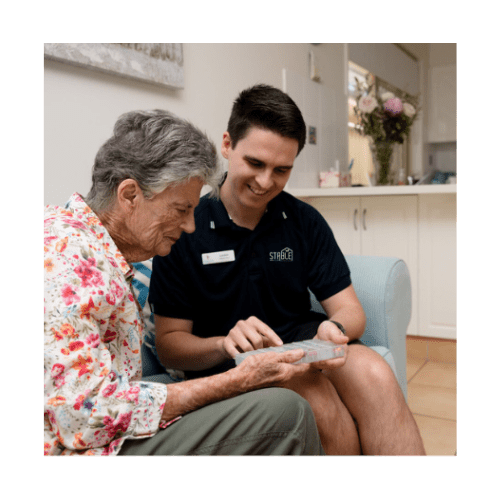The Expanding Need for In Home Care Givers: Factors Families Pick Expert Treatment Over Standard Facilities
The enhancing choice for in-home caregivers over traditional centers is a considerable trend reshaping the landscape of older treatment. Households are attracted to the benefits of personalized care that straightens with specific requirements and choices, allowing seniors to maintain a sense of freedom in a familiar environment. This shift likewise highlights the emotional and monetary considerations that influence decision-making. As we check out the myriad variables adding to this growing demand, the ramifications for both families and caregivers end up being progressively obvious. What does this mean for the future of caregiving?
Personalization of Treatment
Customization of care in home caregiving is necessary for meeting the distinct demands of each individual (ndis plan manager). This approach makes certain that treatment plans are tailored to the certain demands of the individual, considering their case history, personal choices, and way of living. By concentrating on the individual's unique circumstances, caregivers can promote a sense of self-respect and freedom, which is typically lacking in more institutionalized setups

Furthermore, the capacity to adapt care strategies as needs develop is crucial. Home caregiving enables for constant monitoring and modification of care techniques, making certain that modifications in wellness status or individual preferences are immediately addressed. This flexibility not only boosts health outcomes however also boosts the high quality of life for people obtaining care. Ultimately, customized care in home setups dramatically adds to the overall well-being of clients, making it an important element of modern-day caregiving techniques.
Comfort of Home Environment
The comfort of a home setting plays an essential role in the performance of home caregiving. Numerous individuals, especially seniors, experience increased tension and anxiousness when put in unfamiliar settings such as typical treatment facilities.
Moreover, the home setting enables a tailored approach to caregiving, suiting private preferences and regimens. Households can produce an ambience that mirrors their enjoyed one's way of life, ensuring that care is delivered in a manner that really feels comfy and natural. This tailored setting motivates much better communication and interaction in between clients and caretakers, cultivating trust and connection vital for reliable care.
Additionally, the comfort of home can assist in social connections, as family members and close friends can see a lot more conveniently, providing essential emotional support. ndis plan manager. Generally, the home setting not just aids to maintain dignity and autonomy but also contributes to a higher high quality of treatment, making it a recommended choice for family members looking for specialist caregiving remedies

Enhanced Freedom for Seniors
Home caregiving not only provides comfort yet also promotes improved independence for seniors. Unlike traditional centers, at home care allows seniors to preserve their daily regimens and participate in acquainted activities within their own environment. This click reference freedom is essential for their psychological well-being and total lifestyle.
Moreover, at home caregivers can adjust their services to provide particularly to the unique requirements of each senior, advertising a higher sense of control. This flexibility makes certain that senior citizens can appreciate their leisure activities, fraternize friends and family, and stay energetic in their neighborhoods, better improving their feeling of independence.
Inevitably, in-home caregiving not just deals with the physical demands of seniors yet also equips them to lead meeting lives, making it a progressively preferred choice for family members looking for the very best treatment services for their loved ones.
Cost-Effectiveness of In-Home Care
At home care supplies a cost-efficient option to traditional nursing centers, allowing families to give high quality assistance for their loved ones without incurring expensive expenses. The expenses connected with retirement home can be overwhelming, usually surpassing $100,000 each year, which can drain economic sources quickly. On the other hand, in-home treatment solutions generally charge on a per-visit or hourly basis, making it possible for families to tailor treatment strategies according to their spending plan and details needs.
Furthermore, in-home care eliminates additional costs connected with center living, such as board, transportation and room, and numerous administrative charges. Households can choose to engage caretakers only when needed, potentially lowering overall expenses. A substantial benefit of at home care is the ability to keep personal routines, which can contribute to far better psychological health and reduce the demand for expensive medical treatments resulting from abrupt way of living changes.
Insurance insurance coverage, including lasting care insurance, often extends to at home care services, even more improving financial availability (ndis support coordinator). In general, the cost-effectiveness of in-home treatment not only reduces the economic burden on families however also advertises a more personalized strategy to care that lines you could check here up with specific preferences and demands
Building Stronger Family Connections
Providing care in an acquainted atmosphere fosters much deeper family members connections, permitting enjoyed ones to actively participate in the caregiving procedure. In-home treatment creates opportunities for family members to engage meaningfully with their disabled or elderly family members, advertising emotional bonds that can be hard to achieve in institutional setups. The visibility of expert caretakers enables member of the family to concentrate on their relational roles rather than being strained by the physical needs of care.
Furthermore, in-home care allows households to preserve their valued regimens, which can diminish feelings of anxiety and disorientation frequently related to moving to care facilities. Shared meals, familiar environments, and the comfort of home provide a feeling of stability that enhances well-being and promotes open interaction.
Families can collaborate with caregivers to establish customized treatment strategies that reflect the private choices and needs of their enjoyed ones. This joint approach not only equips the elderly but also enhances the family, as members share duties and sustain one an additional via tough times. Ultimately, in-home care cultivates a caring setting where relationships can prosper, improving the lifestyle for both caregivers and recipients.
Conclusion
The boosting choice for in-home caretakers highlights a considerable change in how family members come close to elderly care. As these aspects line up, in-home treatment arises as a compelling alternative to traditional centers, ultimately promoting the health and top quality of life for senior citizens.
Family members are drawn to the benefits of individualized care that straightens with individual needs and choices, permitting seniors to keep a feeling of autonomy in a familiar atmosphere.At home treatment provides an affordable option to typical nursing facilities, allowing families to offer quality assistance for their liked ones without sustaining inflated expenditures. In contrast, in-home care services normally bill on a per-visit or per hour basis, making it possible for families to customize care strategies according to their spending plan and certain demands.
At home treatment page produces opportunities for households to involve meaningfully with their senior or handicapped family members, promoting psychological bonds that can be hard to attain in institutional settings.The boosting preference for in-home caregivers highlights a considerable shift in just how households approach senior treatment.